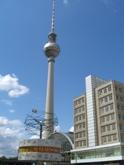Researchers: Prof. Douglas Young (York University), Prof. Lisa Drummond (York University), Prof. Uwe Altrock (Universitat Kassel) and Prof. Eric Clark (Lund University)
Urban life in the 21st century has been shaped in quite significant ways by the thoughts, practices, ideologies and social organization of the 20th century. In this research project we focus on the urban legacies of 20th century socialism and explore their impact on urban policy, spatial form and everyday life in the 21st. With the neoliberal model of city-building appearing to be in crisis mode and new approaches to urban issues urgently needed, we consider the possibility that a critical reassessment of the legacies of socialist models could provide valuable lessons for urban policy makers and citizens alike. This project is of particular relevance to the debates currently underway in many Canadian cities where the question of neighbourhood revitalization can be conceptually reframed as a confrontation with this country’s socialist and modernist urban legacies.
Actually existing socialism has taken many forms ranging from social democracy to repressive state socialism. The common thread of the ‘social’ that runs through them all is a commitment to the modernist idea of universal progress, a desire to create a socially de-differentiated society, and a heightened degree of state intervention in processes of city-building and urban governance. We have chosen three case study cities – Hanoi, Berlin, and Stockholm – as a representation of some of those variations of socialisms as well as variations in their fates. Hanoi continues to be a socialist city today; Berlin struggles with the unification of socialist east and capitalist west twenty years after the fact; and Stockholm remains an icon of enlightened 20th century city-building in a rightward-turning Sweden. In Hanoi three small case studies will be undertaken: the Nguyen Cong Tru housing block, the Hoan Kiem Lake area, and the Reunification (Lenin) Park. These three sites offer insight into the changing context of the city and the contest between market forces and socialist planning in urban development. The focus of the Berlin case study will be the ongoing reshaping of Alexanderplatz in eastern Berlin, the district where the socialist German Democratic Republic created a new and modern downtown for its capital city. Stockholm’s satellite suburb of Vällingby, widely praised when developed in the 1950s as a representation of a distinctively Swedish model in social policy and urban design, will be the case study in that urban region. Our research will trace the recent cultural revalorization of this working class district as seen in a strong housing market and the expansion of its shopping centre.
We will address the following questions in the three case study cities: How is their socialist and modernist past discursively framed – as a problem or a possibility? In what way can current urban politics in the case study cities be considered confrontations with 20th century socialist legacies? What policy lesions from a study of the processes of change in the case study cities could be applied to Canadian and other urban regions?
This project has been made possible through a financial contribution from Social Sciences and Humanities Research Council of Canada. The views expressed do not necessarily represent the views of the Government of Canada.

